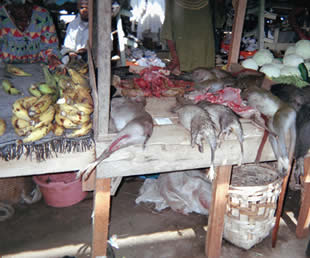News
Study reveals crisis in bushmeat hunting that threatens human food security
A new study involving researchers from Oxford’s Wildlife Conservation Research Unit (WildCRU) has revealed that the hunting and trapping of wild animals – for meat, medicine, body parts, trophies or live pets – is driving an ‘alarming’ number of species to extinction and in the process posing a food security threat for millions of people across Asia, Africa and South America.
The study, led by Oregon State University and published in the journal Royal Society Open Science, used data collected by the International Union for the Conservation of Nature to identify more than 300 species of mammal under threat primarily because of over-hunting. These include large animals such as the black rhinoceros, grey ox and Bactrian camel, as well as several species of bat and 126 species of primate, from the lowland gorilla and chimpanzee to a number of lemurs and monkeys.
Professor David Macdonald, Director of WildCRU, who worked on the study with research associate Guillaume Chapron, said: ‘There are a plenty of bad things affecting wildlife around the world, and habitat loss and degradation are clearly at the forefront, but among the other things is the seemingly colossal impact of bush-meat hunting. You might rejoice at having some habitat remaining – say, a pristine forest – but if it is hunted out to become an empty larder, it is a pyrrhic victory.
‘The number of hunters involved has gone up, and the penetration of road networks into the remotest places is such that there is no refuge left. So it becomes commercially possible to make a trade out of something that was once just a rabbit for the pot. In places like Cameroon, where I have worked, you see flotillas of taxis early in the morning going out to very remote areas and being loaded up with the bush-meat catch and taken back to towns.
‘In WildCRU’s fieldwork in Cameroon we found that far from all the bush-meat was consumed for subsistence – much was sold in large cities, being eaten as a luxury by people reminiscing about a rural past. In the face of impending extinctions, that is an intolerable indulgence.’
Crucially, the study links wildlife conservation to human well-being through the lens of food security – people across much of the globe depend on wild meat for part of their diets. The study authors wrote: ‘An estimated 89,000 metric tons of meat with a market value of about $200 million are harvested annually in the Brazilian Amazon, and exploitation rates in the Congo basin are estimated to be five times higher.’ Loss of these mammals, say the authors, leads not only to an empty landscape and a ‘tragedy’ for conservation, but to an empty larder for the millions of people depending on wild meat for food.
Lead author Professor William Ripple of Oregon State University added: ‘The illegal smuggling in wildlife and wildlife products is run by dangerous international networks and ranks among trafficking in arms, human beings and drugs in terms of profits.’






